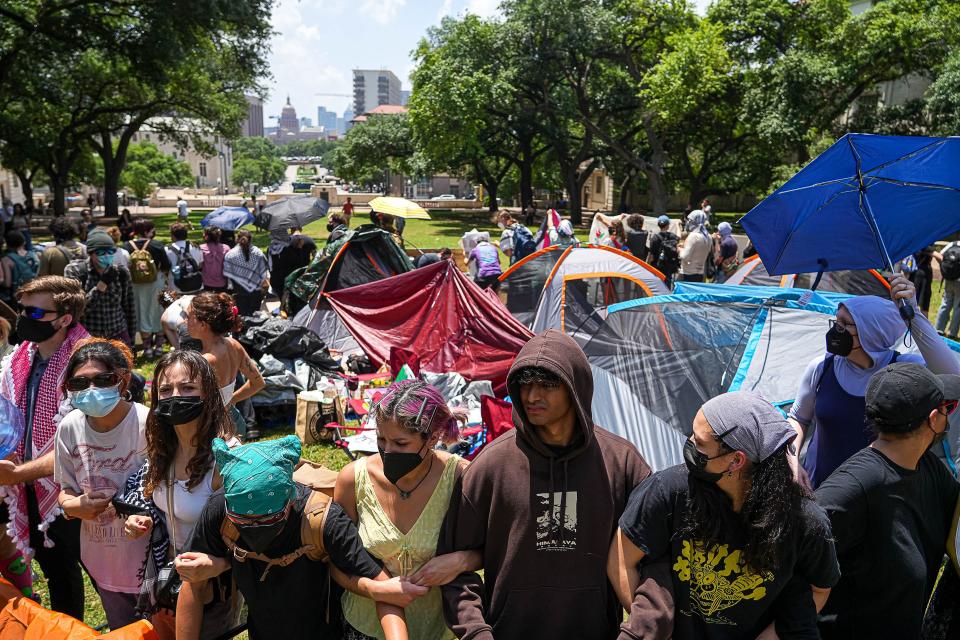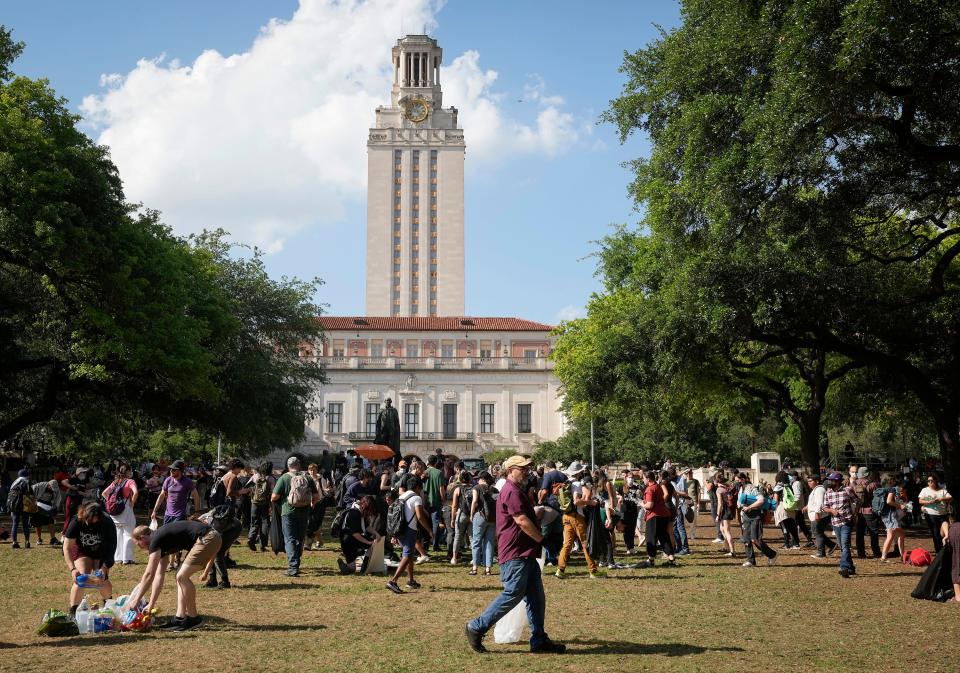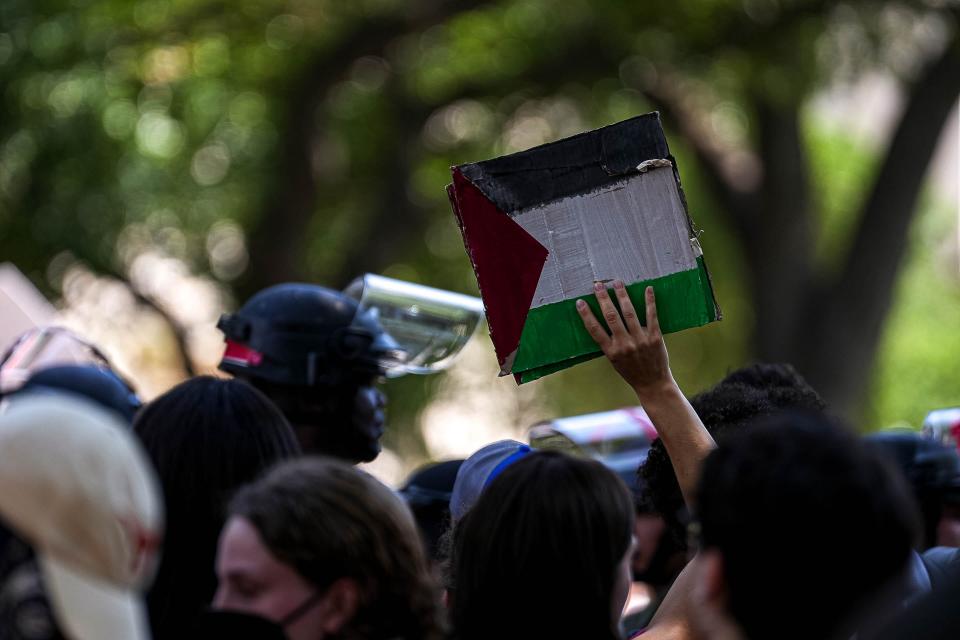Many people outside of UT-Austin attended the pro-Palestinian protests. Here's why
As a Palestinian American whose parents were refugees from the West Bank, 59-year-old Manor resident Haithem El-Zabri has been involved in protests for Palestinian people since he was 12.
El-Zabri, who runs a website called the Palestine Online Store and is a member of the Austin for Palestine Coalition, attended the protests in support of the Palestinian people on April 24 and 29 at the University of Texas where police arrested more than 135 people. Protesters called on the university to divest from its support of weapons manufacturers that supply Israel in its ongoing war with Hamas, which has led to more than 34,000 deaths of Palestinians since the militant group’s deadly Oct. 7 attack on Israel.
Since those arrests, UT has said the majority of the people who were arrested had “no affiliation” with the university and suggested that "outside groups" had influenced the protests on campus. But UT's definition of an "affiliation" with the university was unclear until the American-Statesman asked for a clarification last week. A spokesperson said UT did not deem alumni who participated in the protests as being affiliated with the university.
Pointing to people outside of universities as leading or fomenting pro-Palestinian protests is not unique to UT, as campus leaders have blamed "outside agitators" for the protests across the country, such as those that took place at Columbia University.
But multiple people who spoke with the Statesman said they came to campus at the request of the Palestine Solidarity Committee, a UT student organization, and students who organized the demonstrations. None said they took part in planning the protests.
Whether people are “affiliated” with the campus or not, however, is irrelevant to whether they’re allowed to protest on the UT campus, because Gov. Greg Abbott signed a law in 2019 making public universities a “traditional public forum” where anyone is allowed to protest.
El-Zabri, who is also involved in Indigenous American and environmental activism, is among the protesters who are not connected to UT.
“You don't have to be affiliated with the university to support student demands which completely align with my demands for justice and end to genocide,” El-Zabri said. “And since the university is complicit with the genocide of my people, I don't see how that makes me an outsider.”

Who is ‘affiliated’?
UT has said in statements released to the news media that 45 of the 79 people arrested on April 29 and 26 of the 55 people arrested on April 24 had no affiliation with UT.
An analysis by the Statesman found that nearly 65% of the people arrested on those days had the same name as a student or an alumnus in UT’s directory.
UT spokesperson Brian Davis said the university considered only current students, faculty and staff when it determined who was affiliated. Davis said UT believes its numbers are “rock solid” on who is or isn’t currently affiliated with the university.
The Statesman found that 47 people arrested April 29 were listed as students or alumni of UT, while 32 of the 79 arrested were not students or alumni. Ten of those arrested were listed as alumni, with 37 having the same name as students.
The publication found that 41 people arrested in the April 24 protest had the same name as a student or an alumnus, while 17 were not listed in UT’s directory. Two people taken into custody that day were listed as alumni in the directory, and one of them is a staff member.
Information about who was arrested April 24 is more limited since Travis County Attorney Delia Garza dropped all of the charges, which means charging documents are not available. The Statesman obtained a list of those arrested in connection with the protests, and it was verified by the Travis County sheriff’s office.
UT would not provide the Statesman with its list of who was considered affiliated by the university.

Protesters 'unaffiliated' with UT describe why they joined protests
The Statesman spoke with numerous arrested people who had no affiliation with UT, many of whom would later be labeled by university President Jay Hartzell in a memo as “outside organizers.”
Some are involved with other local activist movements that have helped coordinate other demonstrations in support of Palestinians over the past seven months in Austin. Others included community members, college students from other campuses and a mother from Killeen who just heard about the protests on social media and wanted to show her support.
Court records show that almost everyone arrested came from Austin, while others came from neighboring cities and counties in Central Texas. The farthest hometown of an arrested protester was Houston.
But since the protests took place, Hartzell has cited concerns about people unaffiliated with UT being part of the protests and helping organize them. A memo from Hartzell said the April 24 protest “raised serious concern that outside organizers unaffiliated with our University were influencing our registered student organization to attempt to make Texas the next University shut down by these protesters actions.”
In an op-ed for the Statesman, UT professor Karma Chávez, who has led teach-ins on the South Mall, said the use of the “outside agitator trope” has a long history and is a “red herring that powerful people use to justify police force and discredit local movements.”
The Palestine Solidarity Committee, a student organization that was put on interim suspension for organizing the “unauthorized” April 24 protest, has held dozens of protests since Oct. 7.
Hanna Barakat, a 34-year-old Austin resident and member of the Austin for Palestine Coalition, said the students have often called on other community members and organizations for support.
“We're all small as separate entities, and we're all bigger and have bigger voices when we all are collectively together,” said Barakat, who was arrested April 29.

Last week, police charged San Marcos resident Michael David Maule with a third-degree felony for bringing a gun on campus during the April 29 protest. A search through UT’s records shows that no one with that name is a student or an alumnus.
Zainab Haider, who attended the April 24 protest and is a member of the Austin for Palestine Coalition, said she asked other organizations about Maule, and no one knew who he was.
Zachery Johnson, a 22-year-old Austin Community College student who lives in a co-op in West Campus and works at Moody Center, heard about the April 29 protest on Instagram. He was in one of the tents briefly raised on UT's South Mall and was later arrested.
He denies taking part in planning the encampment, which protesters put up in defiance of campus rules and which led to a heavy police response and the arrests of 79 people. Johnson said he went to what was called the “Liberated Zone” on the South Lawn on April 29 to listen to a pediatric nurse who had just returned from helping in Gaza.
He then saw the tents and tables go up and decided he would stay because it’s an “amazing way to make a statement.” Johnson said he isn’t a longtime activist, noting that this was only the second protest he had ever attended, with a march for Palestine last fall being his first.
“It's done nothing short of motivate me more because it's made me realize how silent some of the issues truly are,” Johnson said.
Hana Yoshimoto, a 34-year-old Austin resident and member of the local Jewish Voice for Peace chapter, heard about the protest through social media and their organization. Yoshimoto was arrested during the April 24 protest and also attended April 29.
Yoshimoto said student organizers with the Palestine Solidarity Committee put out a call for support for community members to join the protests, which is why Yoshimoto attended. Yoshimoto said the original plan was only for a teach-in on the lawn April 24, not a protest.
“In a lot of ways, we're very lucky and privileged to be able to use our voices in this way,” Yoshimoto said. “There's just so much suffering that's happening for people in much more dire circumstances in Palestine.”
This article originally appeared on Austin American-Statesman: 'Outside' protesters say they did not plan UT pro-Palestinian protests

